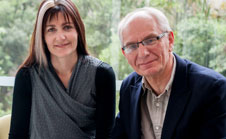
Professors Sunny Collings and Tony Dowell.
Mental health problems are common in New Zealand, and GPs are often the first port of call for help. Those severely affected will be offered treatment in secondary care, but for the many more whose stress is mild or moderate, access to psychological therapies can be limited. An exciting University of Otago Wellington initiative is responding to GPs' need for resources to ensure such people don't fall through the cracks.
The initiative is a condensed model of talking therapy, currently being trialled within GP and practice nurse consultations. Developed by Professor Sunny Collings (UOW Dean and Head of Campus), Professor Tony Dowell (Department of Primary Health Care and General Practice), and clinical psychologist Fiona Mathieson (Department of Psychological Medicine) it uses a structured treatment manual with three very short sessions (an hour in total) and some self-help booklets that GPs can give out on relevant mental health topics.
It is focused and practical, the researchers say, and aimed at those struggling when the “stuff of life” leads into clinical level problems.
This could include problems associated with relationship issues, worry or problematic substance use. Often people will present to their GP with a cluster of problems which might include physical symptoms like back pain.
Professor Dowell is a GP, and his general practice is part of a randomised control trial of the intervention currently underway in Wellington in collaboration with local PHO Compass Health.
The aim of the trial is to demonstrate the intervention's effectiveness, with the ultimate aim of getting it funded so that GPs can offer it in an ongoing way, Professor Dowell says.
The “real world” research is, he says, a response to GPs expressing a need for more resources and support to help people facing moderate mental health issues.
“For example, GPs don't necessarily want to give antidepressants to everybody, or refer them to a clinician they don't know, or can't afford.”
Professor Dowell adds that GPs were saying they wanted to offer more for patients with these problems, for example extended consultations in order to provide problem solving and lifestyle management advice.
The intervention was developed as a collaborative process between GPs, potential patient users and the research team, with seed funding from the Health Research Council, and funding support from Compass Health, the Oakley Mental Health Research Foundation and the Wellington Medical Research Foundation.
A feasibility study of the intervention resulted in good feedback from GPs and an indication more patients get better when it is used. An adapted intervention for Maori clients also had good feedback, and this has been incorporated into the final version.
The evidence is that primary care can be effective in providing brief interventions, Professor Dowell says.
“The potential excitement here is that with relatively little change to the structure or timing of the consultation, new ways of incorporating psychological therapy can be provided.”
